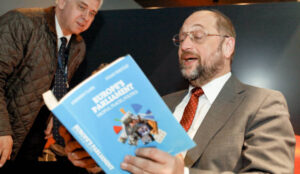

Sir Julian Priestley
When the UK delegation started to arrive at the EP in 1973 (‘started’ because Labour MEPs only joined after the 1975 referendum) expectations were high. After all, parliamentarianism was a British ‘thing’. Sure enough, day one saw the British Conservative MEPs table a memorandum with detailed reform proposals (including regular question times with Commission presidents). The tone was set – not great constitutional changes – but detailed reforms to make the Parliament work better, use the powers that it had to the full and, sometimes controversially, set its own house in order, including reforming the allowances system.

Sir Julian Priestley joined the Parliament soon after British accession in 1973 and went on to become its Secretary General from 1997 to 2007.
Henry Plumb, who was Britain’s first and only EP president, piloted a big change in getting heads of government to accept that he should address each summit meeting at the outset and give the parliamentary position on the main points on the heads of governments’ agenda. Pauline Green, who was de facto majority leader for the Socialists (then the largest group) in the five years from 1994, used her position to fight for reform, including putting some order into the ramshackle allowances system (much to the irritation of many in her own political group). Committee chairs like Ken Collins at Environment used the new powers of codecision the EP was acquiring to maximum effect. British MEPs took legislation seriously and mostly backed the ‘Better Law-making’ agenda, including proper parliamentary scrutiny of comitology decisions.
The British tradition of an independent public service where political affiliation or nationality should not be the decisive factor in appointment and promotions meant that British MEPs and British officials in the EP staff enjoyed, in the main, a healthy relationship. But both shared a political aim which was strong support for EP reform, each using the means at his or her disposal.
In one case, that of Richard Corbett, that support for reform guided his work, both as an official and later as an MEP. Staff like Michael Shackleton and Francis Jacobs made the system of co-decision work in practice. Chris Piening, who died too young, helped to create the unique network of relations with dozens of third country parliaments. Others like Janet Pitt, Nik Lane and the late Nigel Evans went into ‘deep management’ and sought to infuse administrative leadership with public service values. Steve Clark has revolutionised the way Parliament communicates with citizens.
If Brexit really does mean Brexit, one piece of collateral damage will be an enfeeblement of the reform lobby.


Julian Priestley co-authored with Steve Clark Europe’s Parliament: People, Places, Politics, a unique evocation of the “life and times” of the European Parliament (seen left being consulted by Martin Schulz). His other publications included a study of the election of Jean-Claude Juncker in 2014 – The Making of a European President, Palgrave Macmillan – and a political thriller, Putsch. He died in April 2017.
Editor: Eliot Scott-Faulkner

